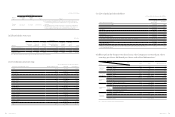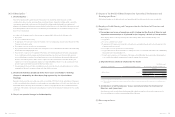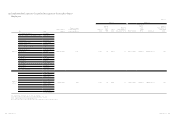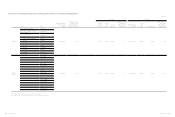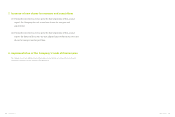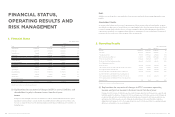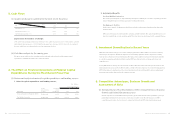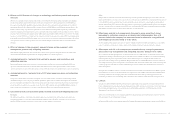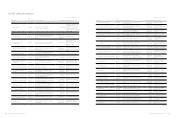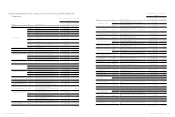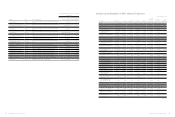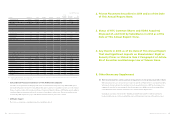HTC 2014 Annual Report Download - page 68
Download and view the complete annual report
Please find page 68 of the 2014 HTC annual report below. You can navigate through the pages in the report by either clicking on the pages listed below, or by using the keyword search tool below to find specific information within the annual report.
• Financial status, operating results and risk management Financial status, operating results and risk management •
132 133
• Factors Favorable to HTC Growth
(1) Partnerships with Industry Leaders Help HTC Drive Industry Trends
HTC has always developed smartphone products in close cooperation with industry leaders such as Google®,
Microsoft®, Qualcomm® as well as the world's leading telecom operators. Examples include HTC's launch of the
world's first Windows Mobile smartphone and first Android smartphone. Our strong partnerships deliver greater
choice to consumers while continuing to drive industry innovation.
(2) Long-term Cooperative Relationships with Telecom Providers Keep HTC Abreast of Consumer Demand
HTC promotes products directly to mass-market consumers via long-term, unique relationships with the world's
largest telecommunications service providers that include the four big mobile operators in the United States, five
major operators in Europe and several fast growing carriers in Asia. These relationships not only keep HTC abreast of
user demand but also allow HTC to better tailor its products and services to the needs of each carrier partner.
(3) Diverse and growing universe of mobile digital services drives smartphone market penetration
New mobile phone operating systems such as Android and iOS, which permit easy app store downloading of
social networking, shopping, travel, game and other software, are attracting even more consumers to the ranks of
smartphone users. Smartphone industry is now in the strong growing stage, and telecom operators' aggressively
rollout of 4G fastest mobile Internet networks to stimulate growth even further. These developments should all have a
positive impact on HTC business growth prospects.
(4) Instilling a positive corporate culture enhances organizational flexibility and responsiveness
HTC promotes a unique corporate culture that is designed to instill passion for innovation and commitment to the
highest quality. Our lack of barriers between departments promotes synergy and dynamism even further. High criteria
of design and manufacture capabilities have been certified by numerous international management requirements,
including ISO 9001, TL 9000, and IECQ QC 0800000. Outstanding in-house research and development capabilities
give HTC the competitive edge to reach the market first with many industry leading innovations and features.
(5) Comprehensive domestic industry base supports current and future growth needs
Active government and private sector efforts to grow the domestic high tech sector in recent decades have given
Taiwan a strong foundation of skilled researchers and technicians. Taiwan is further benefiting from the increase of
industry supply and support systems and industry clustering effects. In addition to making it easier for us to recruit
and retain personnel, these developments allow us to cooperate with domestic and international suppliers in order to
lower purchase costs and respond even faster to industry trends and changes in.
• Factors Adverse to the Achievement of HTC Growth Goals and Relevant
Countermeasures
Many current and potential competitors are now active in the smartphone market looking to benefit from the rapid
growth and demand of smartphone technologies. Competition is expected to continue to intensify as the smartphone user
base grows, smartphone functions and features increase, and smartphone model lifecycles shorten. The following outlines
HTC measures and response to such challenges.
(1) We work actively to establish HTC's brand value, enhance global brand recognition and preference, and leverage
effective brand management activities and product promotions to establish the HTC brand as consumers' "first
choice" in smartphones.
(2) We emphasize innovation to maintain a leading competitive edge. Product differentiation and innovations in
user experience allow us to develop a wide range of products tailored to meet diverse consumer needs. HTC
SenseR is designed with customer at the center to make mobile phones more intuitive and easy to use.
(3) We upgrade our materials requirement planning (MRP) system to improve our ability to manage material
inventories, anticipate future demand in order to drive efficient inventory costs and reduce inventory devaluation
risks. We continue to build and diversify supplier relationships to enhance supply stability. Our objectives are
consistent and uninterrupted supply of all materials. HTC's leadership in the industry helps ensure that suppliers
accommodate and meet HTC priorities in expanding market sales. This helps mitigate risks related to reliance on
overseas suppliers for critical components. We also cultivated strategic business relationship with our suppliers.
(4) Improve working efficiency to ensure maximizing the productivity in each stage; strengthen time management,
standardize work operation, practice total quality management, follow the policy of continuous improvement,
and reduce the unnecessary waste to enhance the competitiveness effectively.
(5) As the fastest growing sector of Taiwan's economy, the electronics industry requires a steady stream of human
resources. Downsizing in the manufacturing sector has increased the difficulty in hiring entry-level workers.
HTC plans to continue to hire foreign workers and work with schools to help increase domestic hiring in the
future.
(2) Risk Factors
The following describes identified risks and rela]ted mitigating measures.
1. Interest, forex, and inflation rate risks and mitigating measures
Impact on HTC profitability:
Item 2013 (NT$1,000 or %)
Net Interest Income 386,172
Net Forex Income 1,097,471
Net Interest Income as percentage of Net Revenue 0.21%
Net Interest Income as percentage of Earnings Before Tax 19.47%
Net Forex Income as percentage of Net Revenue 0.58%
Net Forex Income as percentage of Earnings Before Tax 55.33%
Note: Calculated on HTC consolidated financial numbers
Working capital required to support the expansion of HTC business operations has over recent years been supplied
exclusively from internal finances. As the corporation has not taken out long-term loans, fluctuations in interest
rates have had no effect on the Company's liabilities. HTC is prudent in its financial policies, and our asset allocation
decisions prioritize security and fluidity, with most funds kept in time deposit accounts. In 2014, HTC interest
income totaled NT$ 403 million.


